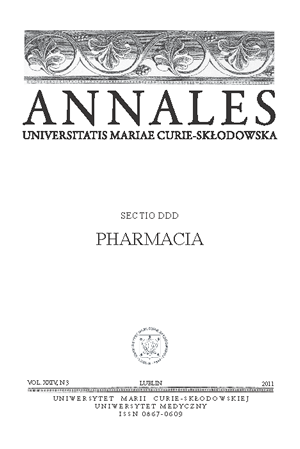The molecular basis of memory: mechanisms, neurotransmitters and receptors involved in cognitive processes
DOI:
https://doi.org/10.12923/Keywords:
acetylcholine, glutamate, brain plasticity, memory and learningAbstract
Memory is a consequence of plastic abilities of brain. It is a dynamic, multi-phase process, which allows adaptation to recent living conditions. The ability to learn resulting from memorisation is an essential human skill that is needed throughout the whole life span. Memory formation consists of the three following phases: encoding, consolidation and retrieval. The molecular mechanism underlying memory is based on the cascade of signaling pathways, which leads to changes in the structure of neurons through gene expression and protein synthesis. The activated brain areas during memory formation are very diverse and depend on memory formation phase, but basically they include the cerebral cortex and the limbic system, especially the hippocampus and the amygdala. Two neurotransmitters: acetylcholine and glutamate play the critical role in the memory process. The process of memory formation is highly complicated and therefore still not explored completely. All over the world, scientists put a lot of effort into making this subject more comprehensible. The latest reports indicate, that PKMζ is an especially critical component involved in the storage mechanism of long-term memory. Better understanding of the mechanisms involved in memory formation may contribute to the development of a new, more effective treatment of cognitive disorders, what is especially important in the face of population aging.
References
1. Abel T., Lattal K.M.: Molecular mechanisms of memory acquisition, consolidation and retrieval. Curr Opin Neurobiol, 11, 2, 2001.
2. Alberini C.M.: The role of reconsolidation and the dynamic process of long-term memory formation and storage. Front Behav Neurosci, 5, 12, 2011.
3. Augustine G.J. (2004). Neurotransmitters, receptors, and their effects. In: Neuroscience third edition. Purves D et al. (editors). Sunderland: Sinauer Associates, Inc.; p.129-164.
4. Blokland A.: Acetylcholine: a neurotransmitter for learning and memory? Brain Res Brain Res Rev, 21, 3, 1995.
5. Buckingham S.D. et al.: Nicotinic acetylcholine receptor signalling: roles in Alzheimer's disease and amyloid neuroprotection. Pharmacol Rev, 61, 1, 2009.
6. Budson A.E., Price B.H. (2001). Memory: Clinical disorders. In: Nature Encyclopedia of Life Sciences. London: Macmillan Publishers Ltd; p.529-536.
7. Daikhin Y., Yudkoff M.: Compartmentation of brain glutamate metabolism in neurons and glia. J Nutr, 130, 4, 2000.
8. Edwards R. et al. (2010). Mechanism of memory foundation. In: Oxford VCE Psychology Units 3 & 4 Student Book. DeBaest I, Salter O (editors). Melbourne: Oxford University Press Australia and New Zealand; p.267-300.
9. Hernandez A.I. et al.: Protein kinase M zeta synthesis from a brain mRNA encoding an independent protein kinase C zeta catalytic domain. Implications for the molecular mechanism of memory. J Biol Chem, 278, 41, 2003.
10. LaMantia A.S. (2004). Plasticity of mature synapses and circuits. In: Neuroscience third edition. Purves D et al. (editors). Sunderland: Sinauer Associates, Inc.; p.575-612.
11. Michael D., Mann M.D.: Learning and memory. http://www.unmc.edu/physiology/ Mann/index.html
12. Miranda M.I. (2007). Changes in neurotransmitter extracellular levels during memory formation. In: Neural Plasticity and Memory: From Genes to Brain Imaging. Bermúdez-Rattoni F (editor). Boca Raton: CRC Press; p.129-146.
13. Poon C.S., Young D.: Nonassiociative learning as gated neural integrator and differentiator in stimulus-response pathways. Behav Brain Funct, 2, 29, 2006.
14. Purves D. (2004). Memory. In: Neuroscience third edition. Purves D et al. (editors). Sunderland: Sinauer Associates, Inc.; p.733-754.
15. Shema R. et al.: Boundary conditions for the maintenance of memory by PKMzeta in neocortex. Learn Mem, 16, 2, 2009.
16. Squire L.R. (2007). Learning and memory. In: The Dana Guide to Brain Health: A Practical Family Reference from Medical Experts. Floyd E, Bloom FE, Flint Beal M, Kupfer DJ (editors). New York: Dana Press; p. 217-225.
17. Taylor P., Brown J.H. (1999). Acetylcholine. In: Basic Neurochemistry: Molecular, Cellular and Medical Aspects. 6th edition. Siegel GJ, Agranoff BW, Albers R.W. et al., (editors). Philadelphia: Lippincott-Raven; p.185-209.
18. Wagner A.D. (2007). Encoding and retrieval from long-term memory. In: Cognitive Psychology: Mind and Brain. Smith EE, Kosslyn SM (editors). New Jersey: Prentice Hall; p.192-238.
Downloads
Published
Issue
Section
License
Copyright (c) 2011 Authors

This work is licensed under a Creative Commons Attribution-NonCommercial-NoDerivatives 3.0 Unported License.


